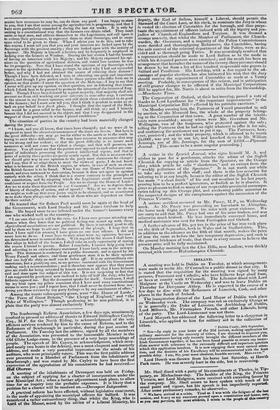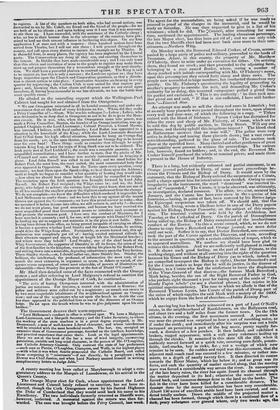Mr. Sheil dined with a party of his constituents at
Thurles, in Tip- perary, on Michaelmas-day. The healths of the King, the Princess Victoria, and Lord Mulgrave, were received with exceeding favour by the company. Mr. Sheil seems to have spoken with much of has usual point and vigour, but his speech is but imperfectly reported. After some preliminary remarks, he observed-
" We have arrived at a mita.. 'fired as I was with the fatigues of the last session, and heavy as my exertions pressed upon a constitution and frame, net, as you may perseive, the most athletic, I wrote to the people of %hist:country to register. A list of the numbers on both sides, who had served notices, was forwarded to me by Mr. Cahill, my friend and the friend of the people—for we
are both of us his clients ; and upon looking over it I saw that it was necessary to stir them up. I have succeeded, with the assistance of the Catholic clergy ; who, no less to their honour than to the advantage of the country, have pro- mised to lend me their utmost influence in furthering this object. On my fast application I at once met with a response : three hundred notices have been served from Thurles, but I will not rest there ; I will proceed throughout the county, and call upon every district to imitate the example set by Thurles. It is shameful how, in many places the registry has been neglected by the Liberal party. The Conservatives are doing all they can, and exerting themselves to the utmost. In Dublin they have made considerable way; and I can only trust that this advice and invitation of mine to the people to register may make them Start up and prepare themselves for a tremendous struggle at the next dissolu- tion. We shall have a powerful phalanx to contend against. The King is said to be against us, but this is only a surmise; the Lords are against us ; they have large majorities upon the Church and Corporation questions, so that a dissolu-
tion is almost certain to take elace. Conservative Societies are forming in every quarter for registering ; the Canton Club is now united for that express pur- pose ; and, knowing that, what shame and disgrace must we not entail upon ourselves, if, having been successful in our late skirmish, we lose the battle that must speedily ensue."
He alluded to the unavailing support which the Wellington•Peel Cabinet bad sought for and obtained from the Orangemen-
" We saw Orangeism reinstated in all its hateful ascendancy, and under cir- cumstances that set the blood of every Irishman on fire. Whom did they make a Privy Councillor of?—Shaw. Who was his colleague ?—Lefroy ; Lefroy, who was declared to be so deep-died in Orangeism as not to be fit to go to the Mun- ster circuit. He it was, who, when the Orangemen came into power, was made a Privy Councillor. Boyton, the founder of an Orange institution' was ap- pointed Chaplain to the Lord-Lieutenant ; Colonel Perceval, a Grand Master, was invested, I believe, with fiscal authority ; Lord Roden was appointed to a situation in the household of the King; while the Lord-Lieutenant dismissed Earl O'Neil from his high official situation, because he hung an Orange flag from his castle, yet, in the open theatre, permitted an Orange flag to be waved over his own head ! These things made us consider that although he might tolerate King Log, at least the reign of King Stork was not to be endured. The Irish party met at Earl Lichfield's ; the result was a complete amnesty, a most unqualified reconciliation ; and I have further to state, that the advice of Mr. O'Connell and some other Members was mainly instrumental in bringing it about. Lord John Russell was called to our head ; and we stood before Sir Robert Peel, the most firm, the most united, the most concentrated body that ever appeared in Opposition. We beat the Tories upon every question, every measure • we beat them upon the Speakership, we beat them upon the Address; until at length we began to consider what quantity of beating they would take —how often we should beat them before they would be compelled to resign. The resolution upon the Irish question was brought forward by Lord John Russell. Sir Robert Peel resigned; the Whigs came in ; and we, the Irish party, who helped to achieve the victory, have this great boast, that not one of us all leis received the smallest place or the slightest enaolutnent from the change. We do not complain—we knew the difficulties which rendered it impossible for Lord Melbourne to confer them ; and we have this to say against all the taunts thrown out against the Government—we have this proud answer to make—that we sustained it before it came into office, we still sustaiu it, and why ?—Because we do not want places, but good measures, and because we have received the most unqualified proof that Government means to introduce such measures as will promote the common good. I have seen the conduct of Ministers, for I have watched it narrowly; and I, for one, will cooperate with Daniel O'Connell in lending my aid to support and maintain it in the place it now holds. After having been driven from office, on being proved incapable of carrying on affairs, it became a question whether Lord Stanley and Sir James Graham, by uniting, could drive the Whigs from office. Fortunately, as events turned out, this ap- prehension was completely got rid of : having excited universal ridicule by their alternate support and sneers, they at length left the Ministerial benches ; and where were they beheld ? Lord Stanley, one of the chief heads of the Whig Government, the supporter of liberality in all its forms, the scion of one of the first families in the kingdom, was seen taking his place by Sir Robert Peel, and sinking down into a miserable, degrading subserviency upon the Tory faction. There Stanley stands,—or, I should rather say, there Stanley lies. Stanley, the brilliant, the intellectual, the profound, of information the most vast, of re- search the most extensive, in argument so acute, in debate so varied, of elo- quence scarce surpassed, of retort most admirable, of powers of illustration in- exhaustible—there Stanley lies prostrate at the feet of Daniel O'Connell."
Mr Sheil then detailed some of the facts connected with the Orange system ; and after referring to Lord Mulgruve's refusal to sanction the appointment of the Orange Mayor of Cork, be continued.— "The evi:s of having Orangemen intrusted with the administration of justice are notorious. For instance, a recent riot occurred in Roscrea; the police and military were called out by a magistrate; an assault was sworn to by two most respectable inhabitants of the neighbourhood against an Orange- man ; and one of the magistrates who sat upon the bench to decide the case has since appeared in the published lists as one of the directors of an Orange lodge. He sat upon the bench where he was to give judgment upon his own brother."
The Government deserve their warm support— -
" Lord Melbourne's conduct in office is without spot. We have a Mulgrave Lord-Lieutenant, and a Morpeth Secretary; and the Under Secretary, to whom the working of the state machine is in a great degree consigned, is Mr. Drummond, a man of well-known Liberal character, and whose interference will be attended with the most beneficial results. The bar, too, occupied an extensive share of Government patronage, founded on the intellect, knowledge, and practical experience that exists there. Look at the legal appointments. Have we not at the head of the bar a man of tried integrity, unswerving patriotism, amiable and long-tried character, in the person of Mr. O'Loughlen, our Catholic Attorney. General. Only contrast the state of bar preferment —such men as Perrin, O'Loughleo, Crampton, and Wolfe, in the highest places —with what it was when Saurin prosecuted the Catholic Board, and called those composing it " miscreants"—if not directly, by a paraphrase ; when Downs was Chief Justice, and when Lord Norbury amused himself in writing complimentary letters to Judge Jebb."



























 Previous page
Previous page